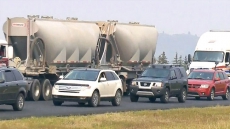OTTAWA — Canadians are paying more for their communications services in a trend driven by increased spending on wireless and Internet packages amid the growing popularity of video streaming services like Netflix.
In a report issued Thursday, the Canadian Radio-television and Telecommunications Commission said households spent an average of $203 per month on their communication services in 2014, up about $12 per month — or 6.2 per cent — from 2013.
Wireless and Internet services accounted for most of the increase, rising by 14 and 10 per cent respectively, the regulator said in the first of its three-part 2015 Communications Monitoring Report.
"In many cases . . . (consumers) are opting for faster and larger Internet packages, as well as using more data on their wireless devices," the CRTC said, adding that prices for telephone, television and Internet services all increased at a rate higher than last year's two per cent inflation rate.
Meanwhile, the regulator said that for the first time, more Canadians subscribed exclusively to mobile wireless services than to landline telephones — 20 per cent versus 14 per cent.
"The transition to the widespread use of mobile wireless services is borne out by the fact that more Canadian households have mobile phones (85 per cent) than landlines (79 per cent)," the CRTC said.
And over the past five years, the percentage of Canadians who have access to a five-megabits-per-second (Mbps) download speed has risen to 96 from 86 per cent.

The switch to online video services has also been swift, with Netflix subscription rates among 18-to-34 year-olds rising to 58 per cent in 2014 from 29 per cent in 2013 among anglophones, and to 24 from seven per cent among francophones.
Viewing of traditional television has remained virtually unchanged, slipping to an overall average of 29 hours per week in 2014 from 29.8 in 2011, although there was a big difference among age groups.
Canadians aged 18 to 34, for example, spent just 20 hours a week watching conventional television compared with 42 hours for Canadians aged 65 and over.
Overall revenue generated by the communications industry grew to $63.2 billion in 2014, up 2.1 per cent from $61.9 billion in 2013.
OpenMedia.ca, a non-profit consumer advocacy group, said the report shows that Canada "has a long way to go create more affordable telecom options."
"Once again (it) confirms that Canadians continue to pay some of the highest prices in the industrialized world, especially on wireless," it said.
"With telecom costs skyrocketing, Canadians are looking to the newly TBelected Liberal government for leadership on how to address these increasingly unaffordable yet essential services," OpenMedia campaigns manager Josh Tabish said in a statement.
As a result, Tabish noted that only two-thirds of Canada's lowest income residents have cellphones, compared with 96 per cent of the highest income earners, while just 59 per cent of the lowest income households have Internet access compared with 98 of the highest income households.

In the coming weeks, the CRTC plans to publish data pertaining to the telecommunications sector, followed by information about the broadcasting sector.



